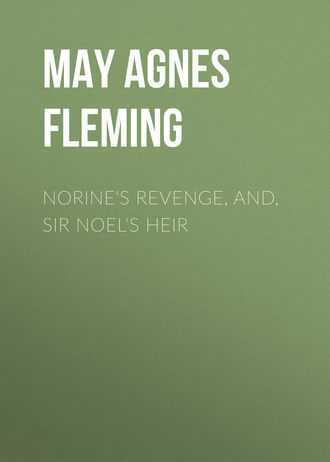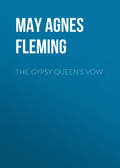
May Agnes Fleming
Norine's Revenge, and, Sir Noel's Heir
CHAPTER XXI.
"THE MILLS OF THE GODS GRIND SLOWLY, BUT THEY GRIND EXCEEDINGLY SMALL."
At the drawing-room window of the late Hugh Darcy's old-fashioned house, Hugh Darcy's heiress sits. It is a dreary November day, a long, lamentable blast soughs through the city streets – the two vestal poplars toss their green arms wildly aloft in the gale, and the sleety rain goes swirling before it. At all times a quiet street, it is entirely forsaken to-day. Far off comes the clatter and jangle of passing street-cars, the dull roar of the city's ceaseless life. In this by-street peace reigns.
Yet Norine sits by the window gazing steadfastly out at the wet, leaden, melancholy afternoon. In her lap some piece of flimsy feminine handicraft lies – on the table before her are strewn new books and uncut magazines. But she neither embroiders nor reads – she lies back against the crimson velvet of the old chair looking handsome and listless, her dark, thoughtful eyes, gazing aimlessly at the lashing rain. Now and then they turn from the picture without to the picture within, and she sighs softly.
A bright fire burns in the steel grate and lights ruddily the crimson-draped room. On a sofa drawn up before it, in a nest of pillows, Helen Thorndyke lies so still, so white, you might think her dead. But she is not even asleep, although she lies motionless with closed eyes. Her life seems to have come to an end. Pride she has, and it has upheld her, but love she has too, and pride cannot quite crush it out. Since that fatal September night she has been here – since that night his name has never passed her lips; these two women, whose lives Laurence Thorndyke has marred, never talk of him. She lies here and broods, broods, broods ever – of the days that are gone and can never come again.
On the floor near, little Laurie is building a house of blocks, and squat in the centre of a wool rug baby Nellie crows delightedly and watches the progress of the architect. So the minutes tick off, and it is an hour since Norine has entered the room.
In the library, before her entrance here, she has had an interview with Richard Gilbert – it is of that interview and of him she sits thinking now. Some business connected with Mr. Darcy's estate has brought him, and she has asked him, constrainedly enough, for news of Laurence Thorndyke.
"I keep Liston on his track," she said, playing nervously with her watch chain. "Helen says little, but she suffers always. And Liston's news is of the dreariest."
The strong, gray eyes of the lawyer had lifted sternly to her face. No word of censure had ever escaped his lips – what right had he? but Norine felt the steady rebuke of that firm, cold glance. He knew all, and she felt he must utterly despise her now.
"He has fallen very low," Mr. Gilbert answered, briefly, "so low that it is hardly possible for him to fall much lower. In losing his wife and children he lost his last hold on respectability, his one last hope on earth."
"He deserved to lose them," Norine said, with a flash of her black eyes.
"Perhaps so. From all I hear you should know best. But if stern justice is to be meted to us all, after your merciless fashion, then Heaven help us! If vengeance can gratify you, Mrs. Darcy, you may rest well content. He has sunk as low as his worst enemy could wish. But – you might have spared Helen."
Cold, cutting, the words of rebuke fell. He arose, gathering up his papers, his face set and stern. Her face drooped – she covered it with her hand, and turned away.
"She at least had never wronged you," Richard Gilbert pitilessly went on. "Have you made her any happier, Mrs. Darcy, by taking her husband from her? In spite of his myriad faults she loved him – she trusted him, and so, neither poverty, hard work, nor neglect could make her altogether miserable. You led him on – led him on from the first, in cold blood, working for your revenge. And when you had crazed his brain by your smiles and fair words, and allurements, you brought his wife here to overhear the passion you had labored to inspire. You madden her in turn, you take her from him, you order him from your presence like a dog. You took from him the one good angel of his life – his wife – and gave him up boldly to the devil. He has earned it all, you have your revenge, but – as I stand and look at you here, I wonder – I wonder if you can be Norine Bourdon."
A dry sob was her answer. He had poured forth the words, passionate reproach in his voice, passionate anger in his eyes. And she had shrank away before his just wrath like a guilty thing.
"His home is a gambler's hell – his food and drink are the liquid fire called whiskey; his associates are the scum and refuse of the city. Mrs. Darcy, I wish you joy of your work!"
"Spare me," she faltered.
Mr. Gilbert looked silently for a moment at the bowed figure, then took his hat and turned to go.
"I beg your pardon," he said, very quietly. "I had no right to speak at all. My only excuse is, that I will not so offend again. How is Helen?"
"As she always is. She says nothing; she lies and suffers in silence. Will you not see her?"
"Not to-day; it is painful to me; I can see it is painful to her, poor child. Good-afternoon, madam."
He bowed with formal coldness and was gone. So! she had had her revenge, but was the "game worth the candle" after all? Is revenge ever worth its cost, she began to wonder.
"Vengeance is mine, I will repay." Yes, yes, she was beginning to see it all? And – Christianity apart – revenge, as we wreak it, after our poor light, is so apt to recoil on ourselves.
So, Norine sits by the window now, thinking over this pleasant interview and "chewing the cud of sweet and bitter fancies." Much more bitter than sweet. Until she had lost Richard Gilbert's good opinion utterly, she had never known how she prized it.
Presently glancing back from the darkening day without, at some lustier shout than usual of Master Laurie, she finds Helen's large, mournful eyes fixed upon her. She rises, crosses over, kneels down by the sofa, and kisses tenderly the wan cheek.
"My dear," she says, "what is it?"
"Is – ," she falters, "is there any news of him?"
"No news – only the old story. Nellie! Nellie! I begin to think I have done grievously wrong."
"How, Norine?"
"By bringing you here that night. I have been sinned against, but I have also been sinning. I had taken the fortune he prized so highly; I should have been content with that. But I was not. When I returned there was no thought of him in my mind, except the hope that we might never meet. We did meet, and when I saw his growing admiration for myself, I – Nellie, forgive me if you can – I did encourage it. I wonder at my own wickedness now; I am sorry, sorry, sorry. I know I should never have brought you here that night. Badly as he treated you, you were happier with him than you are now. And I parted you. Nellie, forgive me!"
Something that was almost color flushed into the pale face – something that was almost light into the blue eyes. The soft lips set themselves firmly.
"There is nothing to forgive. I thank you for having brought me here that night. Sooner or later I would have known all. And I was not his wife he said – you were – not I. 'In any case, I will have a divorce.' Have you forgotten those words? 'I never cared for her – I loathe her now – I married her for her dower.' Have you forgotten that? He deserved all. I don't blame you. We are only human, and I say again I am glad I know. I suffer, but no blame attaches to you for that suffering. He was treading the down-hill road before you came; he is only finishing the journey as it would have been finished in any case. I hate myself for my own misery. I hate myself that I cannot tear every thought of him out of my heart. But I think of the past, and I cannot."
She broke down suddenly, violently, passionately almost, for the first time, into wild, hysterical weeping. Norine took her in her arms, her own tears falling, and let her sob her sorrow out. The paroxysm was brief as it was stormy. She drew herself away suddenly, and buried her face, among the pillows.
"Don't mind me, please," she said; "don't talk to me. I am ashamed of my own weakness, but – "
Norine kissed her very tenderly.
"I am glad to see you cry, Nellie – anything is better than this dry, stony grief. I will take the babies down to supper, and send you up yours. And Nellie, dear, you must eat it; remember we start on a journey to-morrow."
The journey was to Kent Hill, where they were to stay over Christmas and New Year. Norine had made one flying visit already – had been clasped in Aunt Hetty's arms, had kissed Uncle Reuben's sunburnt cheek, had heard Uncle Joe's husky "Right glad to see you back, Norry," and – that was all. She took the old place, and, after one twilight talk, the past was never referred to. Truthfully and simply she told them all, not even excepting the darkest part – her own revenge bitterly repented of when too late. Now she and Helen and the children were going down for a long visit. One other guest there was to be – one who had spent every Christmas at Kent Hill during the past four years – Mr. Gilbert.
"Christmas wouldn't seem like Christmas now without him," Aunt Hetty said. "I don't believe there's his equal in wide America. A gentleman from top to toe, if there ever was one yet."
The children Aunt Hetty took to her motherly heart at once – Helen's pale lips she kissed, and Helen was at home in five minutes, as though she had known them for years. It was such a blessed, restful place – the tired heart drew a great sigh of relief, and felt half its weary load lifted off. For Norine – she was almost the Norine of old, flying up and down breezy stairways, in and out breezy rooms, the old songs rippling from her lips, until the thought of the pale, widowed wife down-stairs made her check them. Then came winter – the first fall of snow – the first gay sleighing. Little Laurie was wild with delight – even Helen's pale lips learned to smile. Kent Hill was working a transformation.
Christmas drew near, and among Norine's pleasant duties came that of decorating Mr. Gilbert's room, the old guest chamber, where he had spent so many happy, hopeful nights in the time when he had loved her. He despised her now. Ah, what a wretch she had been! He would despise her always. Well, she deserved it all; it didn't matter; but – and then a heavy sigh finished the thought. She was learning the value of what she had lost when too late.
Christmas arrived – Mr. Gilbert arrived. And Helen's wistful eyes looked into his face, and asked the question her lips were too proud to shape.
"There is no news," he said softly, as he bent over her chair; "only the old news. He is well – that is the best I can tell of him."
No more was said. Norine, proud and humble together, rather avoided him. Still they were of necessity a great deal together, indoors and out, and, in the genial glow and cheerfulness of the Christmas-time, the reserve of both melted. It began to be like old times – the bright color, the gay laugh, the light step, the sparkling eyes, the sweet singing, made Norine the very Norine of four years ago. And Mr. Gilbert – but Mr. Gilbert was ever quiet and undemonstrative; his calm, grave face told little, except that he was quietly happy; that you could see.
Christmas passed, New Year passed, Mr. Gilbert went back to New York. And suddenly a blank fell upon Kent Hill, sleighing and skating lost their zest – the weather grew colder, the dull country duller, and Mrs. Darcy, at the close of January, abruptly announced her intention of returning to New York also.
"If you are willing to come, Nellie," she said; "of course if you would rather remain – "
"I would rather go," Helen answered. "I have been happier here than I ever thought to be again, but I would rather go."
That settled it. They went. And on the second of February Mrs. Darcy donned velvet and sables, and set off for Mr. Gilbert's office. Was it altogether for Helen's sake – altogether for news of Helen's husband? Well, Mrs. Darcy did not ask herself the question, so no one else perhaps has any right to do so.
Looking very fresh, very stately, very handsome, she came like a bright vision into the lawyer's dingy office. A little desultory talk then – playing with her muff tassels, she asked the old question:
"Was there any news of him?"
"Yes," Mr. Gilbert answered this time; "there is news. He has been very ill; he has been in a hospital; some blow on the head received in a drunken brawl. I hunted him up the day he was discharged. A most pitiable object I found him – penniless, friendless, and still half dazed from the effects of the blow. I took him to a respectable boarding-house, paid a month's board in advance, and obtained the landlady's promise to look after him a little more than usual. He is there still, but gone back to the old life. I fear all hope for him is at an end."
Norine's face had fallen in her hands.
"May Heaven forgive me my share in his ruin! Oh, Mr. Gilbert! it may not be yet too late. Who knows? I will go to him – I will beg his forgiveness – he shall return to his wife and children. Give me his address" – she started impetuously to her feet, her face aglow – "I will go at once."
He gave it to her without a word, written on a slip of paper. As she took it, she paused and looked at him with clasped hands.
"Mr. Gilbert," she faltered, "if – if I do this will you forgive me?"
He laid his hand on her shoulder, almost as a father might, more moved than he cared to show.
"I forgive you now," he answered.
She left the house, entered her carriage, and bade the coachman drive to the address. Then with a glow of new hope, new happiness at her heart, she fell back. Yes, she would atone for her sin – she would labor with all her strength to reform Laurence Thorndyke, to win forgiveness from Heaven and her friends. Fifteen minutes brought her to the street. Before one house a crowd had collected, a suppressed murmur of infinite excitement running through the throng.
"It is the very house we are looking for, ma'am" said the coachman, opening the door.
She could not tell why, but some swift feeling of evil made her get out and join the crowd.
"What is it?" she breathlessly inquired.
"Man jumped from a three-story window and killed himself," was the answer.
She pressed forward, her hand on her heart – very pale.
"Why did he do it?" she asked.
"Del. trem., ma'am."
"Jim jams, misses."
"Delirium tremens, madam," interposed a gentlemanly man, touching his hat. "He jumped from that upper window, stark crazy, not five minutes ago. Very sad case – very sad case, indeed. A gentleman once. I knew him well. His name is Laurence Thorndyke."
CHAPTER XXII.
"THE WAY OF THE TRANSGRESSOR IS HARD."
She stood for a moment faint, sick, stunned, unable to speak or move; then she pressed forward, still without a word, through the throng. All made way for the beautiful, richly-robed lady with the death-white face and dilated eyes.
"Wife," one whispered, falling away.
"Not his wife – his sister," another conjectured.
"Neither," a third said. "I know her. It's Mrs. Hugh Darcy, his late uncle's adopted daughter. He has no sister, and his wife left him long ago."
It is doubtful if she heard; it is certain she never heeded. All she felt or knew was that Laurence Thorndyke lay yonder on the blood-stained flags, dying hard. She was kneeling beside him – a bleeding, mangled heap, crushed almost out of semblance of humanity.
"Laurence! Laurence!" she gasped. "Oh, Heaven! not dead! not dead!"
"Not dead, madam," a pitying voice answered – "not dead yet. I am a physician, and I tell you so. He is insensible at present, but consciousness will return. You know him?"
"Know him!" She looked into the grave, compassionate face with dazed eyes. "Know Laurence Thorndyke? What is it you intend doing with him?" she asked.
The medical man shrugged his shoulders.
"Send him to Bellevue, I suppose, unless some friend steps forward and takes charge of him. They won't want him there" – signifying the boarding-house – "again. And if he is sent to a hospital, I wouldn't give much for his chances of life."
"There is still a chance, then?"
"Well – you know the formula, 'while there's life there's hope.' With the best of care, and nursing, and medical aid, there may be one chance in a hundred for him. With hospital care and attendance, there's not a shadow."
Then for the space of five seconds a pause fell. The city street, the gaping, curious crowd around her faded away, and there arose before Norine a far different and never-to-be-forgotten picture – a desolate autumn evening; a gray, complaining sea, creeping up on its gray sands, a low, fast-drifting sky lying over it, and on the shore a girl standing, reading a few brief lines in Laurence Thorndyke's writing – lines that branded her as a thing of sin and shame for life – that broke her heart as she read. And now – her enemy lay here at her mercy. Why should she lift a finger to save him? Why not let him go to the hospital and take his chance? All that man can do to ruin a woman, body and soul, he had done – why should she lift a finger to save him now?
She thought all this in a moment of time. The tempter stood at her side and rekindled all the pain, and hatred and horror of him. Then her eyes fell upon the crushed, bleeding, senseless form at her feet, and she turned from the dark thoughts within her with horror of herself.
"Well, madam?" the voice of the medical man said, a little impatiently, "how is it to be? You evidently know this unfortunate young man – shall he be removed to the hospital, or – "
"To my house!" She rose suddenly, her self possession returning. "And I must beg of you to accompany him there. No efforts must be spared to restore him. Carry him to the carriage at once."
Men came forward, and the insensible figure was gently lifted, carried to the carriage, and laid upon the cushions.
Norine entered, and took his head in her lap. The doctor followed.
"Home!" she said to the coachman, and they drove slowly back, through the busy streets, to the quiet, red-brick mansion that for years had been Laurence Thorndyke's home.
"How should she tell Helen?" All the way that thought filled Norine.
Through her the wife had left the husband. Was Death here to separate them still more effectually? Would he ever have come to this but for her? In some way did not this horror lie at her door? In all the years that were to come could she ever atone for the wickedness she had done.
As she sat here she felt as though she were a murderess. And once she had loved this man – passionately loved him. "Fiercest love makes fiercest hate." He had cast off that love with scorn, she had vowed revenge, and verily she had had it! Of fortune, of wife and child, and now of life, it might be, she seemed to have robbed him.
"Oh, forgive me my sin!" her whole stricken soul cried out.
They reached the house, the coachman and the physician lifted the still senseless man and carried him to an upper chamber. Summoning her housekeeper to their aid, Norine left them and went in search of the wounded man's wife.
She found her in her own room lying listlessly, wearily, as usual, upon a sofa, gazing with tired, hopeless eyes at the fire, while her little children played about her. Kneeling before her, her face bowed upon the pillows, her tears falling, her voice broken and choked, Norine told the story she had come to tell. In the room above her husband lay, injured it might be unto death.
"If he dies," Norine said, her voice still husky, her face still hidden. "I shall feel, all my life-long, as though I were his murderess. If he dies, how shall I answer to Heaven and to you for the work I have done?"
Helen Thorndyke had arisen and stood holding by the sofa for support, an awful ghastliness on her face, an awful horror in her eyes. Dying! Laurence dying! and like this!
"Let me go to him!" she said, hoarsely, going blindly forward. "You are not to blame – he wronged you beyond all forgiveness, but I was his wife and I deserted him. The blame is mine – all mine."
She made her way to the room where they had laid him. On the threshold she paused, faint almost unto death. The yellow, wintry sunshine slanted in and filled the chamber. Upon the white bed he lay, rigid and ghastly. They had washed away the clotted blood, and the face was entirely uninjured. Worn, haggard, awfully corpse-like, it lay upon the pillows, the golden, sparkling sunshine streaming across it.
"Laurence! Laurence! Laurence!"
At that anguished cry of love and agony, all fell back before the wife. She had crossed the room, she had fallen on her knees by the bedside, she had clasped the lifeless figure in her arms, her tears and kisses raining upon the still rigid face. All was forgotten, all forgiven – the bitter wrongs he had done her. Nothing remained but the truth that she loved him still, that he was her husband, and that he lay here before her – dying.
Dying! No need to look twice in the physician's sombre countenance to see that.
"He will not live an hour," he said, in answer to Norine's agonized asking look; "it is doubtful whether he will return to consciousness at all. There is concussion of the brain, and several internal injuries – any one enough to prove his death. Mortal aid is unavailing here."
Dying! Yes, even to Norine's own inexperienced eyes the dreadful seal was yonder on the face among the pillows. His wife's arm encircled his neck, her face was hidden on his bosom, a dull, dumb, moaning sound coming from her lips. He lay there rigid – as if dead already – all unconscious of that last agonized embrace of love, and forgiveness, and remorse.
The doctor left the room, waiting without in case his services should be needed. Norine dispatched a messenger to Mr. Gilbert, another for a clergyman. He might return to reason, if only for a moment before the spirit passed away.
"He cannot – he cannot die like this!" she cried out, wringing her hands in her pain. "It is too dreadful!"
The doctor shook his head.
"Dreadful indeed. But 'the way of the transgressor is hard.' He will never speak on earth again."
Richard Gilbert came, almost as pale as the pale remorseful woman who met him. It was the physician who encountered and told him the story first. He entered the room. Norine stood leaning against the foot of the bed. Helen still knelt, holding her dying husband in her arms, her face still hidden on his breast. One look told him that the awful change was already at hand.
And so, with the three he had wronged most on earth around him, Laurence Thorndyke lay dying. Out of the hearts of the three all memory of those wrongs had gone, only a great awe and sorrow left. For Norine, as she stood there, the old days came back – the days that had been the most blessed of her life, when she had given him her whole heart, and fancied she had won his in return. Old thoughts, old memories returned, until her heart was full to breaking; and she hid her face in her hands, with sobs almost as bitter as the wife's own.
The moments wore on – profound silence reigned through the house. Once doctor and clergyman stole in together, glanced at the prostrate man, glanced at each other, and drew back. Priest and physician were alike powerless here. The creeping shadow that goes before was upon that ghastly face already. Death was in the midst of them. Without opening his eyes a sudden tremor ran through the senseless form from head to foot. Helen lifted her awe-struck face. That tremor shook him for a moment as though the soul were forcibly rending its way from the body. Then he stretched out his limbs and lay still.







